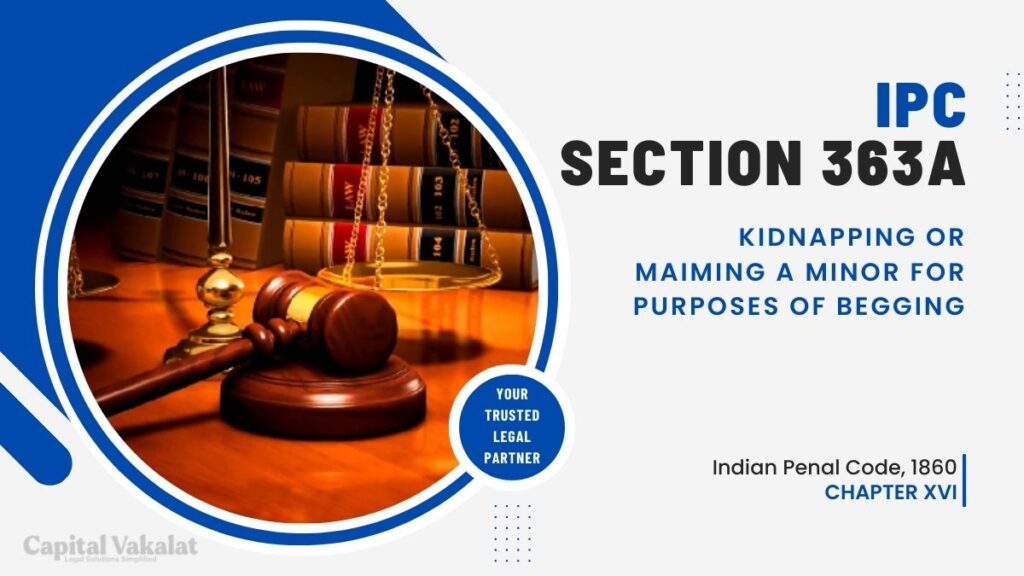Kidnapping and maiming minors for the sinister purpose of begging is a grave issue that continues to haunt societies worldwide. In India, Section 363A of the Indian Penal Code (IPC) stands as a bulwark against such heinous acts. This article aims to delve into the depths of this legal provision, exploring its implications, the prevailing challenges, and the imperative need for effective enforcement.

At the heart of the matter lies Section 363A IPC, a legal safeguard designed to curb the kidnapping or maiming of minors for begging purposes. This provision acknowledges the vulnerability of minors and seeks to shield them from falling victim to a nefarious nexus that exploits their innocence for economic gains.
Understanding Section 363A IPC
Section 363A of the IPC stipulates stringent penalties for those found guilty of kidnapping or maiming minors with the intent of forcing them into begging. The legal distinction between kidnapping and maiming within this section is crucial, as it differentiates the various forms of exploitation covered by the law.
Prevalence of the Issue
Despite legal safeguards in place, the prevalence of kidnapping or maiming minors for begging is alarming. Statistics reveal a disturbingly high number of cases, shedding light on the pressing need for heightened vigilance and proactive measures to protect the vulnerable section of society.
Profile of Perpetrators
An analysis of individuals involved in such crimes exposes a complex web of motivations. Whether driven by economic desperation or organized crime, understanding the profile of perpetrators is pivotal in devising effective strategies to thwart their activities.
Impact on Minors
The consequences of such heinous acts extend beyond the immediate physical harm. The kidnapped or maimed minors often bear the scars, both physical and psychological, throughout their lives. Exploring these impacts is essential to comprehending the urgency of addressing this issue.
Legal Consequences
Section 363A IPC outlines penalties for those found guilty, ranging from imprisonment to fines. Real-world case studies serve as stark reminders of the legal actions taken against perpetrators, offering insights into the judiciary’s role in ensuring justice.
Challenges in Enforcing the Law
While the legal framework exists, challenges in enforcing Section 363A persist. From resource constraints to the clandestine nature of these activities, law enforcement faces hurdles that require strategic solutions to fortify the implementation of the law.
Preventive Measures
A multifaceted approach is necessary to combat this societal ill. Community awareness programs, collaboration between law enforcement agencies and non-governmental organizations, and the active involvement of citizens can act as preventive measures, creating a united front against such crimes.
International Perspective
Comparisons with laws in other countries provide a broader perspective. Examining best practices globally offers valuable insights that can be adapted to strengthen the Indian legal framework and enforcement mechanisms.
Conclusion
In conclusion, Section 363A IPC stands as a beacon of hope for the protection of minors against kidnapping or maiming for begging. However, the battle is far from won. It necessitates collective efforts, involving the government, law enforcement agencies, NGOs, and the public, to ensure the effective implementation of the law and the safeguarding of our society’s most vulnerable members.
Frequently Asked Questions
What is the minimum and maximum penalty under Section 363A IPC?
The penalties vary, including imprisonment and fines, depending on the severity of the offense.
How can individuals contribute to preventing such crimes?
Individuals can contribute by staying vigilant, supporting awareness campaigns, and reporting suspicious activities to the authorities.
Are there rehabilitation programs for the victims mentioned in Section 363A IPC?
Yes, rehabilitation programs exist to assist the victims in recovering from the physical and psychological trauma they may have endured.
Can NGOs play a role in enforcing Section 363A IPC?
Absolutely, NGOs play a crucial role in collaboration with law enforcement to raise awareness, provide support, and contribute to the prevention of such crimes.